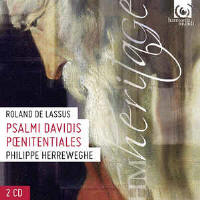Texte paru dans: / Appeared in: |
|
|
Outil de traduction (Très approximatif) |
|
|
Reviewer:
Fabrice Fitch
Philippe Herreweghe's recording of Lassus's last work, Lagrime di San Pietro (Harmonia Mundi, 8/94), is one of the finest recordings of pre-Baroque music ever made; so it's a real treat to welcome, 12 years on, his account of the composer's early penitential masterpiece. Its appearance coincides with the reissue of another complete recording, first issued in 1998, by the now defunct Henry's Eight. The Collegium Vocale's complement is slightly larger than the Cambridge group's, and includes women on the top lines where Henry's Eight use countertenors. The vocal style, however, is even more different: Henry's Eight opt for a relatively uninflected dynamic (an unforced forte), singing out all the while, whereas the Collegium Vocale's interpretation is more clearly 'conducted', with Herreweghe's guiding hand always in evidence. Neither ensemble displays the degree of attention to individual textual details of the Hilliard Ensemble's reading for EMI (nla); but with Herreweghe this seems to have been a matter of deliberate choice . There is plenty of judicious contrast, but not too much; the emphasis is, rather, on the settings' monumentality. And that is surely a defensible standpoint, given that the longest of these psalm s approaches the half-hour. It's also worth saying just how fine the Collegium Vocale sounds on this new recording: from a technical standpoint it clearly outclasses its rivals. Herreweghe's approach, as I have said, may not be the only one, but then how clear his textures, how ' legible' the counterpoint I In his hands, the one psalm of the set of which I had not been entirely convinced (the third) begins to make more sense, and the Miserere, the cycle's literal centre and affective core, receives its most polished and affecting reading . Unlike Henry's Eight, who tended to rush things, Herreweghe judges its tempo to perfection. This is the psalm that most calls to mind the Lagrime in its pared-down technique, and the fine expressive balance between self-abasement and nobility of purpose. Here the Collegium Vocale's countertenors take the top line and the basses go to 'the very bottom of the cellar'. One of the set's finest pieces calls forth the Collegium Vocale's finest interpretation . As things stand, Henry's Eight provide an interesting mid-price alternative, and they include the setting of the two 'Laudate' psalms with which Lassus rounded off the cycle, which the Collegium Vocale miss out; but Herreweghe's cycle is unquestionably the finer achievement, a fastidious account that is unlikely to age or be superseded anytime soon. |
|
|
Sélectionnez votre pays et votre devise en
accédant au site |
|
|
|
|
|
Cliquez l'un ou l'autre
bouton pour découvrir bien d'autres critiques de CD |
|



